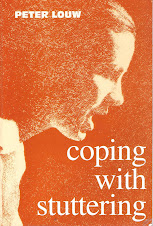A person who stutters (PWS) recently wrote me: ‘Even when I’m very relaxed I still stutter. So the theory that stuttering is linked to tension is wrong!’
My answer:
Don’t confuse ‘stress’ with ‘tension’. Stress and tension are not quite the same – stress is a more general term and can be measured by blood pressure, heartbeat, perspiration etc. Tension is more localised and refers to a set of muscles, such as the vocal cord muscles. Stress and tension are, however, to some extent linked; for instance, general stress can increase localised muscle tension.
General stress CAN and usually DOES have an effect on the vocal cord muscles of PWSs. Many PWSs (probably most) report that their speech is worse when they are stressed.
In some situations, however, the PWS’s vocal cord tension can be high though his stress level is not. To understand this phenomenon, one has to remember that another factor comes into play in stuttering, namely HABIT, also known as LEARNED BEHAVIOUR.
The force of habit
Stuttering tends to become a habit, and in the course of years it can become deeply ingrained and lodged in your subconscious. After many years of stuttering your subconscious memory becomes riddled with stuttering responses. And not only with stuttering responses – TENSION AS WELL AS STRESS RESPONSES CAN THEMSELVES BECOME HABITUAL. We LEARN to respond in a stressful manner to some things, so that stress usually becomes part and parcel of the stuttering problem.
Stress and habit are therefore major factors in stuttering. These major factors, that is to say stress and habit, are not necessarily present in a 50:50 relationship within the PWS. For many PWSs – perhaps the majority – the stress factor is more prominent than the habit factor. In other words, the speech of these PWSs is very much affected by stress, whereas the element of habit is not as prominent. These PWSs are situational stutterers – they have areas of fluency, especially when relaxed, but stutter when in stress.
Low stress, but high tension
For some other PWSs, the habit factor is more prominent. These PWSs stutter in most or all situations, and overall stress fluctuations seem to have little effect on their speech. What has happened here is that VOCAL CORD TENSION HAS BECOME HABITUAL. These PWSs can be regarded as ‘advanced stutterers’, because the disorder has not only become deeply entrenched, but has taken over most or all of their areas of speaking, eg. even while talking when alone or when talking to a pet etc. Their stuttering is very consistent (as opposed to the intermittent stuttering of the situational stutterer). Their vocal cords are, while speaking, continually in habitually excessive tension - EVEN IF THEY FEEL GENERALLY UNSTRESSED OVERALL.
I suspect that the PWS who wrote to me about him stuttering while relaxed falls into this second category of stutterers. This person’s general stress level may have been low, but his vocal cord tension was high enough to exceed his vocal cord tension threshold.
So in summary, in order to better understand stuttering:
1) Don’t confuse generalised stress with localised vocal cord tension
2) Note that stress USUALLY (but not always) increases vocal cord tension
3) Though stress may be low, vocal cord tension may still be high, for instance due to learning (habit)
4) Conversely, it can happen in some situations that though stress levels are high, vocal cord tension is low, resulting in fluent speech. We are people, not machines, and the correlation between stress/tension and stuttering is not 100%.







I agree that that Stress and Tension are not same but they are most extent Interrelated.I remember that when I had started to use Passive Airflow technique I learnt wrong technique unconsciously that's why I started to stutter even when alone due to increased tension.It suggest that Vocal Cords Tension plays a major role in stuttering and those who have high Speech tension should reduce their Tension by using some sort of fluency technique and those who have high stress must learn Stress Management.
ReplyDelete